This post may contain affiliate links. Please read my disclosure and privacy policy.
This Almond Milk recipe is an easy dairy-free alternative that tastes even better than the store-bought variety. All you need is 2 ingredients to get started!
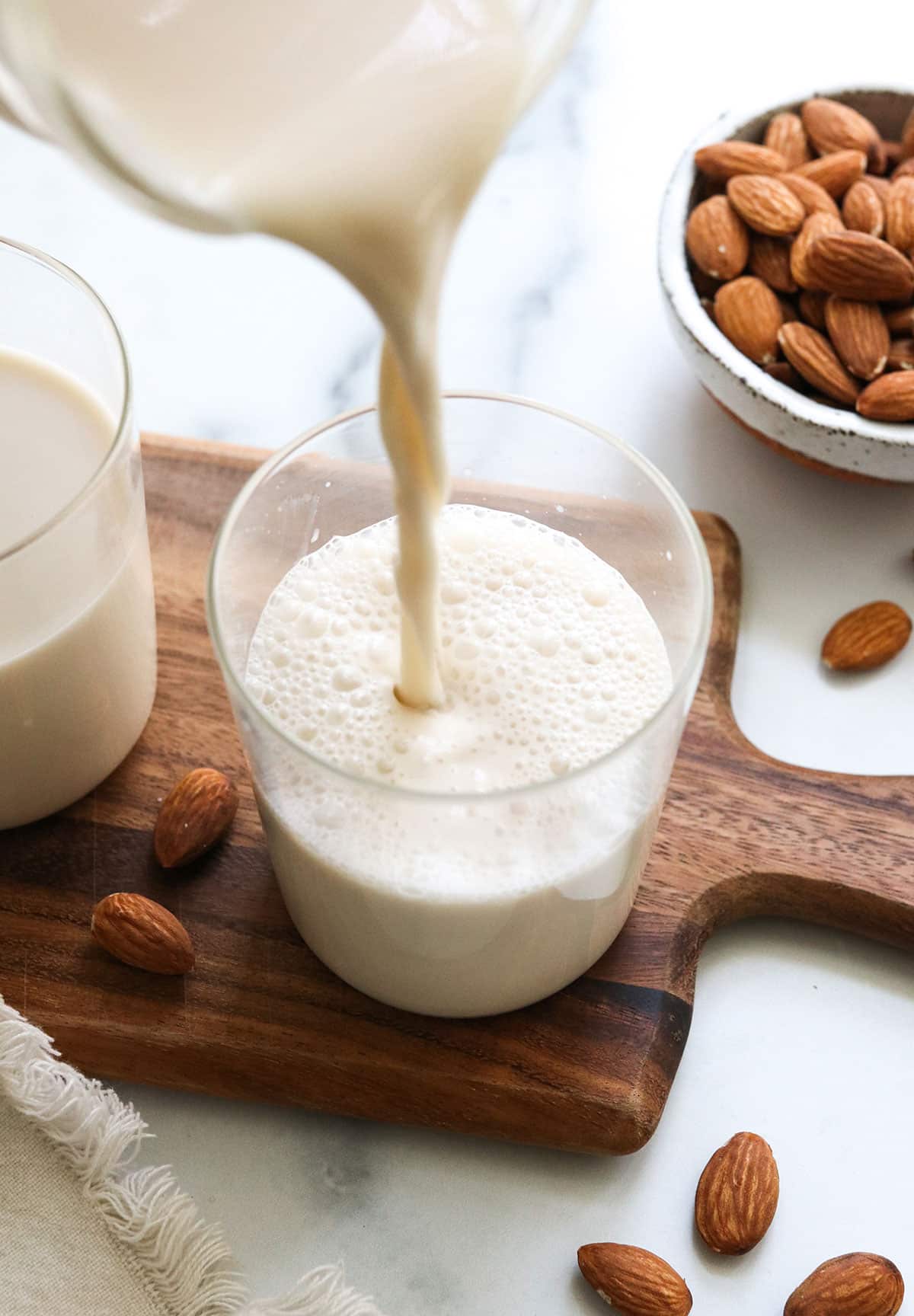
For those who can’t tolerate cow’s milk, almond milk is an easy lactose-free option. You can use it in smoothies, soups, sauces, cereal, and more!
Homemade almond milk tastes far superior when compared to store-bought almond milk, so be warned– you may never want to buy the prepared version again.
Store-bought almond milk relies on preservatives for a longer shelf life and often has gums and thickeners added to make the milk have a uniform consistency. When you make almond milk at home, you can skip those added ingredients, so it tastes better.
Wondering what to do with the pulp?
Use the leftover almond pulp to make Almond Pulp Hummus or Almond Pulp Brownies.
Ingredients You’ll Need
The only two ingredients you need to make almond milk are almonds and water. I tend to use almonds that are not roasted or salted, so the almond milk will have a neutral, mild flavor. However, roasted nuts will work, too!
If you want to make flavored almond milk, you can also add vanilla extract and a splash of maple syrup, for sweetness.
Check out my Vanilla Almond Milk and Chocolate Almond Milk variations for guidance.
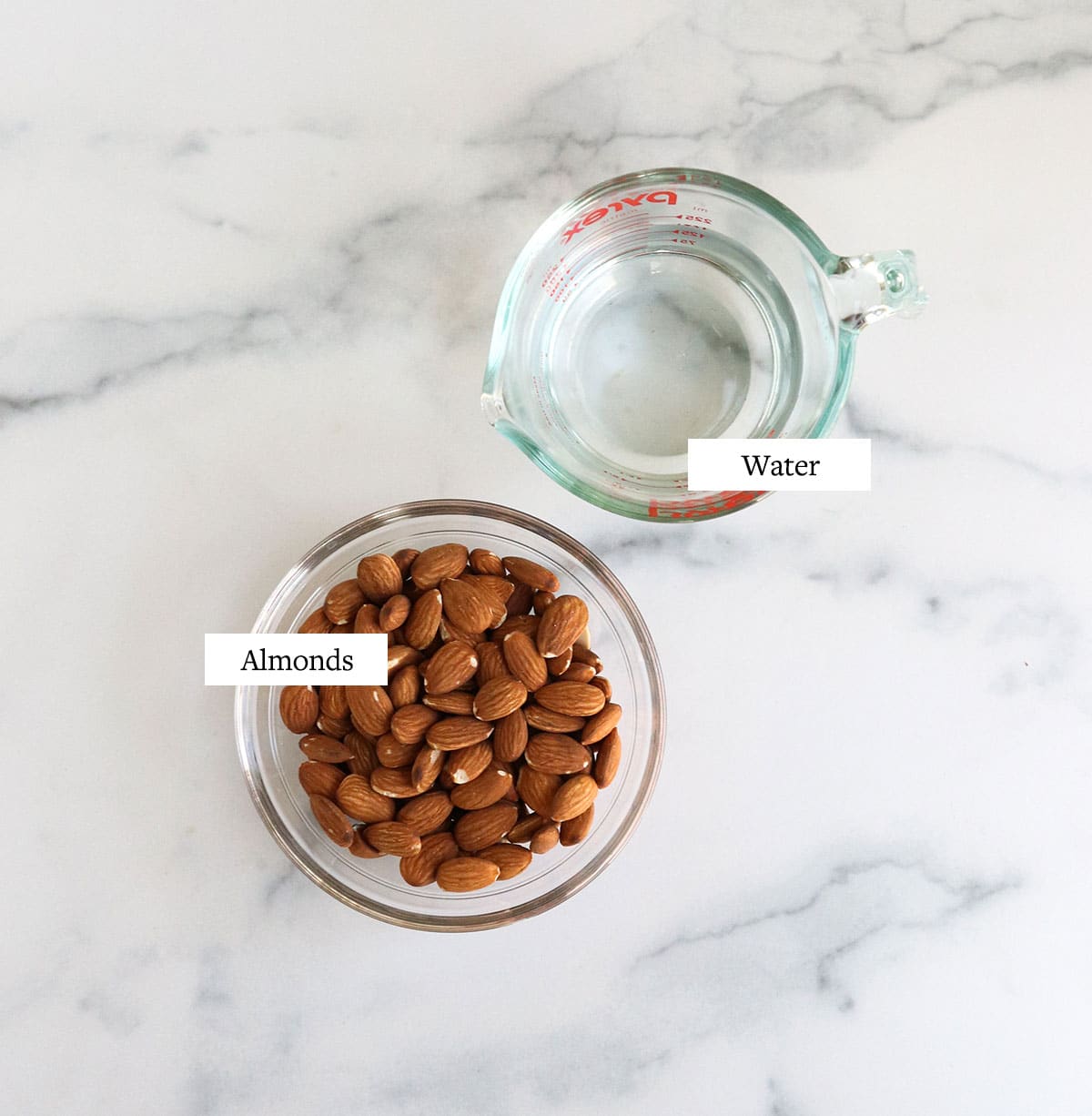
How to Make Almond Milk
- Soak the almonds.
Research doesn’t necessarily support the idea that soaking nuts improves digestion or reduces anti-nutrients, but soaking almonds ahead of time can make them softer and help them break down in your blender more easily.
If you want to take the time to do this step, cover the almonds with at least 2 inches of water, so they have room to expand as they soak. (I usually use 2 cups of water to cover 1 cup of almonds.) Let them soak for up to 8 hours, then drain away the soaking water by pouring the almonds into a fine mesh strainer.
You can skip this step if you already have a high-speed blender that can break down almonds effortlessly, or if you’re simply short on time!
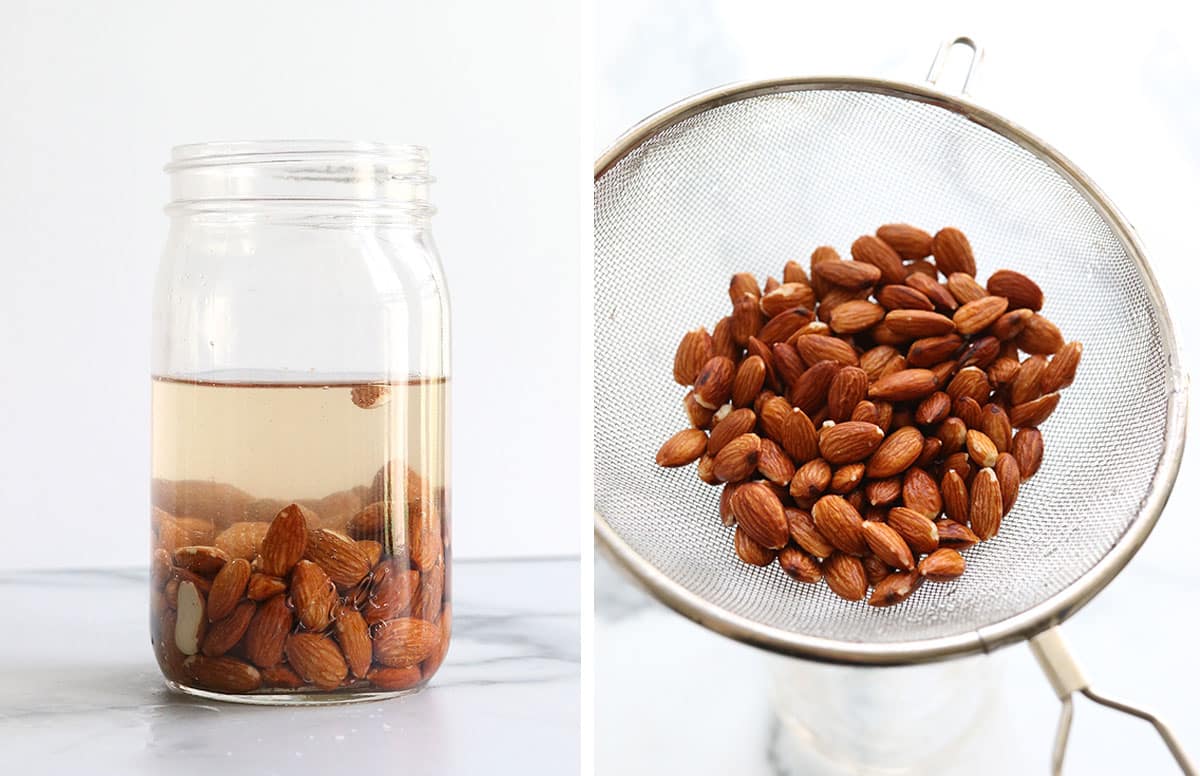
- Blend.
Add the almonds into a high-speed blender, along with 4 cups of fresh water. Secure the blender’s lid and blend until the almonds are broken down and the mixture looks creamy, about 60 to 90 seconds.
There should be almost no visible almond pieces when it’s done blending.
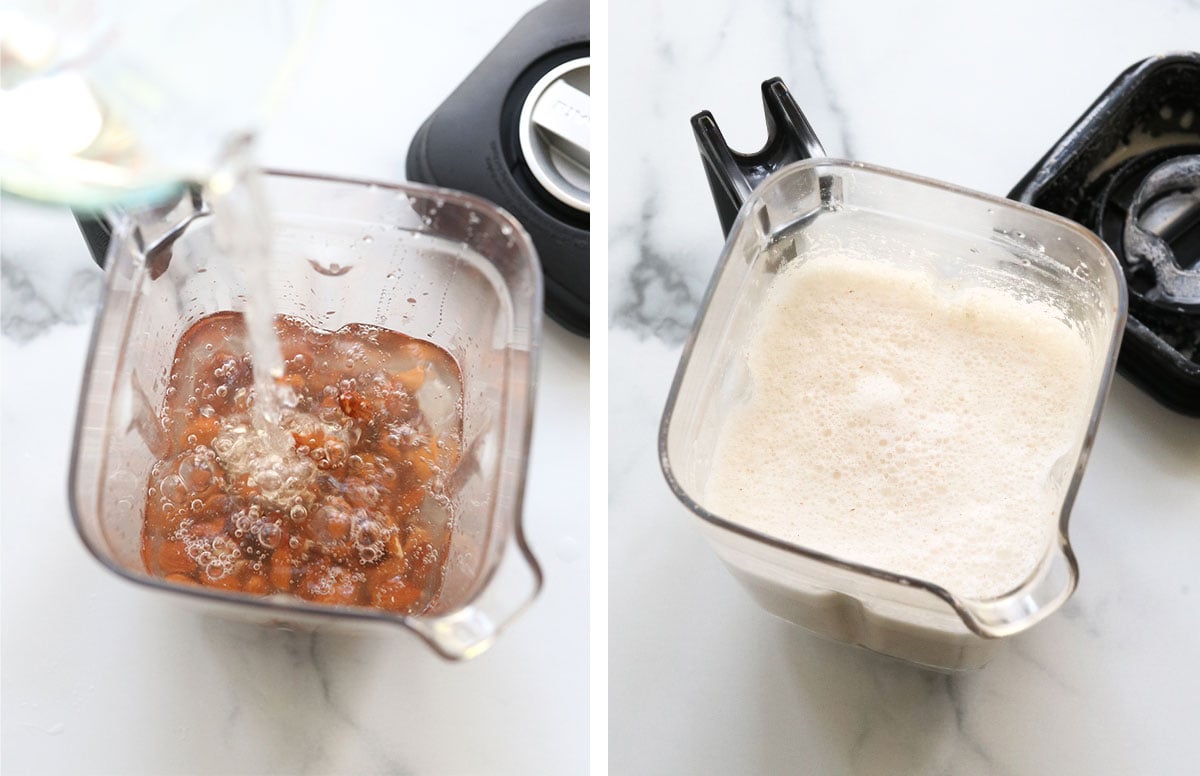
- Strain.
Arrange a nut milk bag or cheesecloth over a large bowl, then pour the blended almond mixture into the bag. Carefully squeeze the bag, removing as much liquid from the almond pulp as possible.
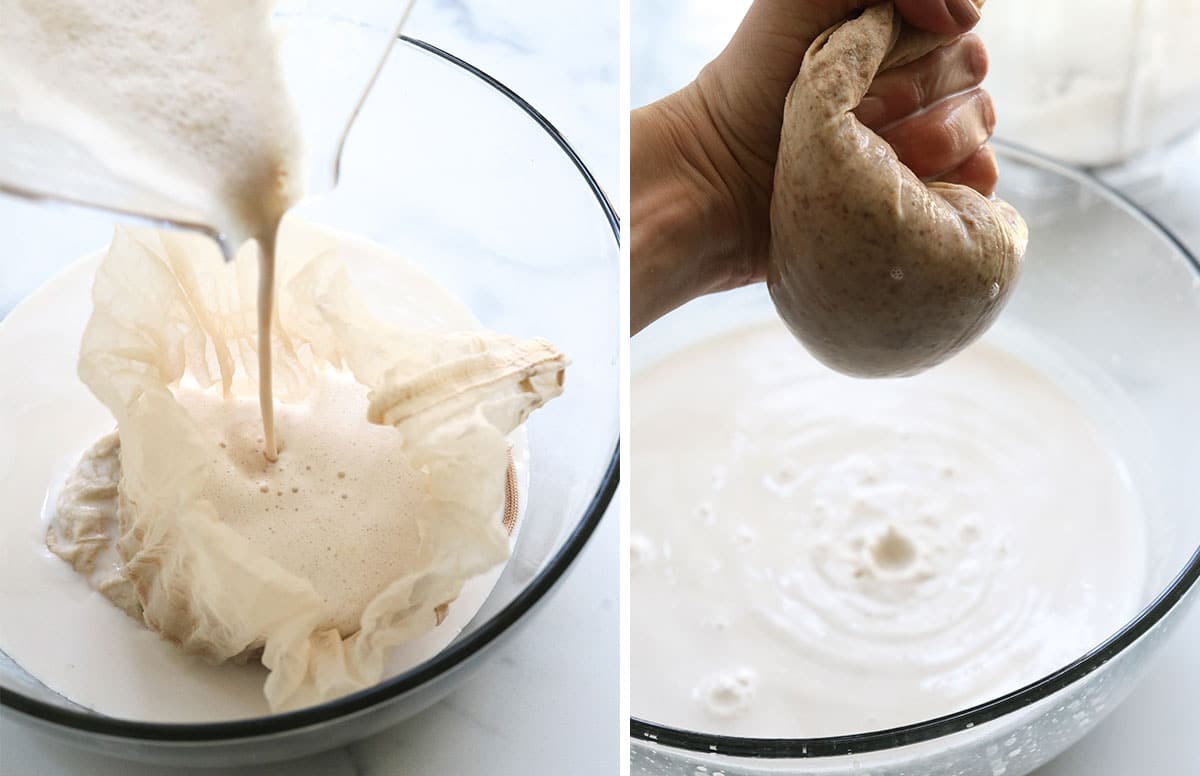
- Enjoy!
You can use the almond milk right away, or add any extra flavorings to taste, such as vanilla, maple syrup, or a pinch of sea salt. Transfer the almond milk to an airtight container and store it in the fridge for up to 5 days. Or you can freeze it for up to 3 months.
Because this recipe doesn’t call for any preservatives, it won’t last as long as store-bought milks do. (You’ll be able to tell it’s gone off when the smell or flavor goes sour.)
Be sure to make only what you’ll drink in a week, or plan on freezing the leftovers. You can easily scale the recipe as needed!
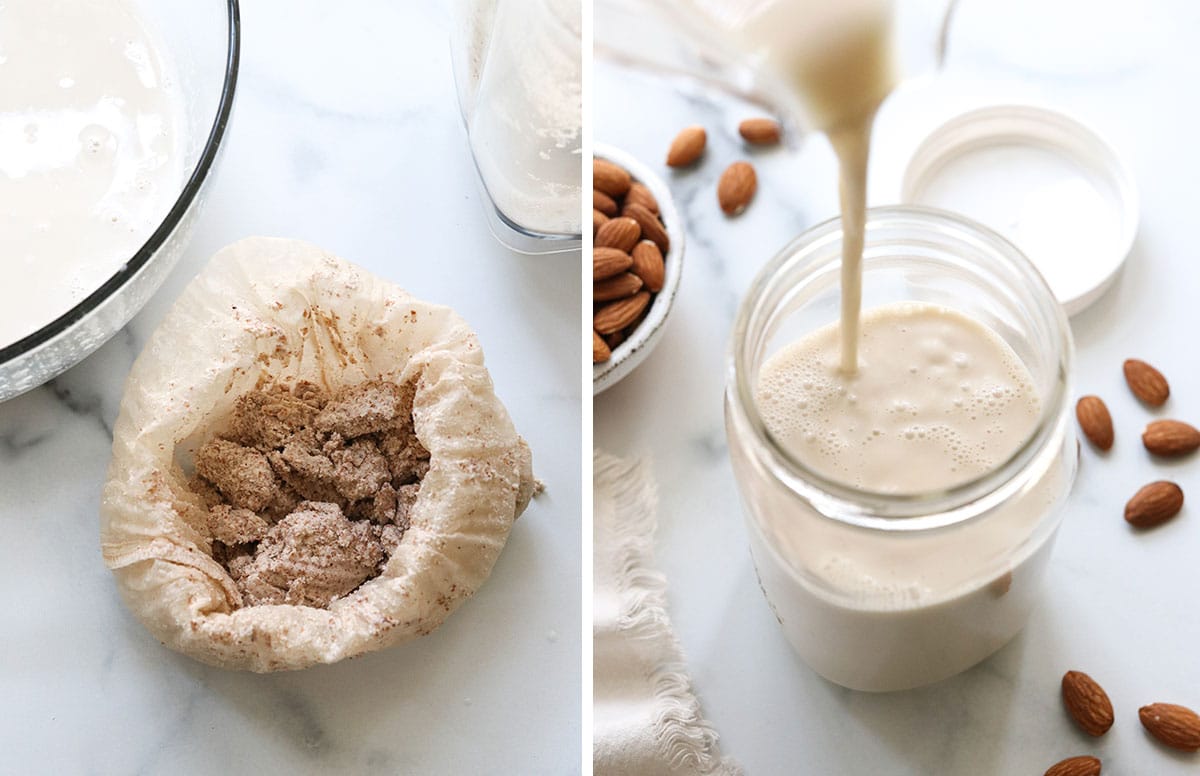
Looking for more dairy-free milk ideas? You can make homemade oat milk for an affordable option, or try hemp milk for extra plant-based protein.
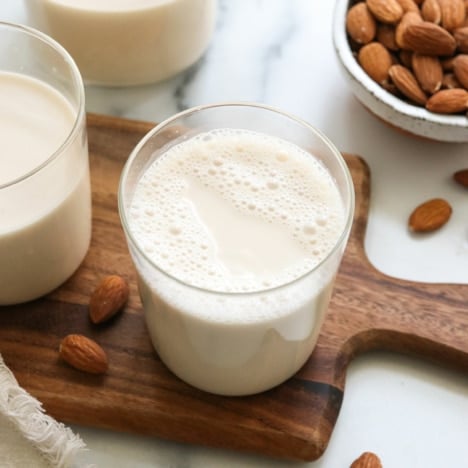
Ingredients
- 1 cup almonds
- 4 cups filtered water
Instructions
- To soak the almonds before blending, cover them with 2 cups of water in a large bowl or jar, and let them soak for 4 to 6 hours. This step is optional, but may help with blending later if you don't have a powerful blender. Drain the almonds through a fine mesh strainer before moving on to the next step.
- Add the almonds and 4 cups of fresh water to a blender. Secure the lid and blend on high-speed for at least 60 seconds, until no pieces of almonds are visible and the mixture looks creamy.
- Pour the almond milk through a nut-milk bag or cheese cloth, squeezing well to extract the milk. You can save the remaining almond pulp for another recipe (see the full post for ideas) or discard. If you would like to flavor the almond milk with vanilla or chocolate flavorings, this is the time to whisk in any additions.
- Store the almond milk in an airtight container in the fridge for up to 4 days. (You can freeze leftovers, if needed, for up to 3 months, too!)
Video
Notes
Nutrition
If you try this almond milk recipe, please leave a comment and star rating below letting me know how you like it!




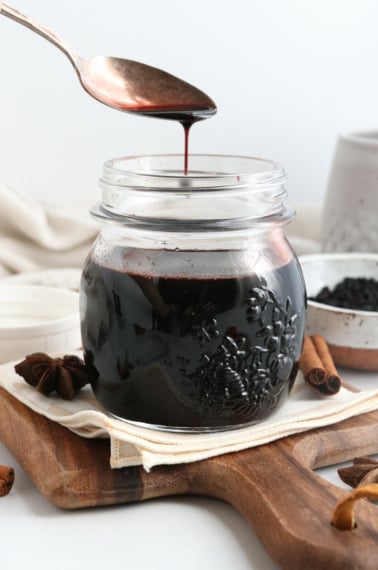
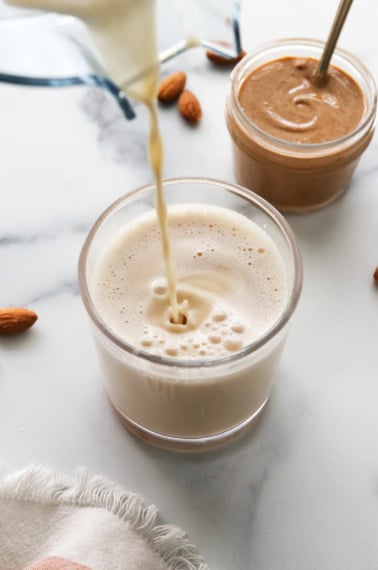






I finally got it!! almond milk that doesn’t separate in coffee. I make my milk in batches of 2 litres so I don’t have to do it everyday. So with 2 cups soaked almonds well rinsed, 8 cups of filtered water, pinch of celtic salt and 1/2 cup soaked sunflower seeds and 1/2 cup soaked sesame seeds, (those two soaked together to make it easier as sesame seeds are very small and fall through the sieve when rinsing, so they attach themselves to the sunflower seeds and I loose less) . Blended together with the almonds and water, then put through the cold press juicer to extract even more nutrients, the almond milk is now perfect, does not curd. tastes beautiful. I thought I’d share :))
I was skeptical at first because I’ve honestly never made almond milk before!! I can’t believe how easy it is and it’s delicious!!! I am using my as coffee creamer!
Thank you!!
May I ask why is it necessary to discard the soaking water if it is filtered? Why not just use this same water when blending? It seems as though the original water would retain more of the nutrients. Not being critical- Just curious. Thank you-
If you want to use the soaking water for blending, you can! When I was into eating raw foods (over a decade ago!), I learned that soaking almonds helps remove phytic acid, and phytic acid may inhibit iron absorption. So, I’ve always been in the habit of discarding the soaking water and starting with fresh for blending.
Creamy , easy recipe and taste was 5 *.
Thank you
My homemade almond milk separates when used for a cup of coffee. I keep having to turn the spoon otherwise it doesn’t look too appetizing. is there any way to stop the milk from separating in the coffee?
Absolutely delish and defo so much tastier than shop bought! Thanks!
I just made this. So simple and tasty. I love the fact that it is 2 ingredients. Never buying store bought again. I Can’t wait to make the hummus. Bravo and thank you.
Very easy to make. I soak my almonds for 11 hours and used 31/2 cups of water to blend. I favored the milk with vanilla and sugar free maple syrup. I used the pulp and made almond hummus, that came out really good too!
Great idea for making hummus with leftover pulp. I will try that myself. Thanks
Can I use raw sliced almonds to make the almond milk? Would I use the same amount of nuts?
So deliciously simple!!!
If you don’t strain the pulp can you drink it as it is? is it good for you?
There is a LOT of pulp left, so the texture isn’t lovely if you leave it in. But, feel free to experiment with it! I use the leftover pulp to make Almond Pulp Hummus as a snack.